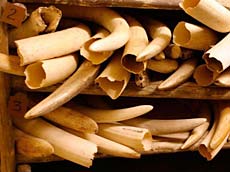
of government-registered ivory stockpiles
from four southern African countries
Click photo to enlarge © TRAFFIC
Geneva, Switzerland, 15 July 2008—China has been approved as a buyer of the one-off sale of African Elephant ivory under strict conditions. The decision was taken at a Convention on International Trade in Endangered Species of Wild Fauna and Flora (CITES) meeting in Geneva, Switzerland.
Members of the CITES Standing Committee voted by a clear majority in favour of acceptance of China as an approved buyer. The decision comes into effect once it enters the meeting’s formal written record.
Members of the CITES Standing Committee voted by a clear majority in favour of acceptance of China as an approved buyer. The decision comes into effect once it enters the meeting’s formal written record.
The request to trade African Elephant ivory was originally approved at the CITES Conference of the Parties in 2002 and then modified to include new conditions at the meeting in 2007. The CITES meeting this week was charged with deciding whether China could be approved as a trading partner. To gain approval, China had to convince CITES it had put in place adequate measures to manage regulated sales and tackle any illegal domestic ivory trade.
“China has acted rather successfully against its own illegal domestic ivory market,” said Tom Milliken, Director of TRAFFIC East/Southern Africa. “Now China should help other countries do the same, especially in Central Africa where elephant poaching is rampant and Chinese nationals have been implicated in moving ivory out of the region.”
The Chinese government could help to improve international co-operation in tackling poaching, smuggling and enforcement issues, and with conservation awareness programmes that send out a clear message to Chinese nationals abroad that it is illegal to buy and bring home ivory from West and Central Africa, where it is sometimes sold openly and illegally. In 2004, CITES Parties drew up an action plan for tackling these problem markets, but so far, with the notable exception of Ethiopia, progress has been slow.
“The sight of ivory openly and illegally on sale in many African cities is likely to be a far more powerful encouragement to those contemplating poaching and smuggling, than a strictly controlled one-off sale,” said Dr Susan Lieberman, Director of WWF International’s Species Programme. “The only way to end elephant poaching is through an effective clampdown on illegal domestic ivory markets.”
China joins Japan in now having CITES approval to bid in the one-off sale for registered government-owned ivory stockpiles from four southern African countries—Botswana, Namibia, South Africa and Zimbabwe.
Conditions of the sale direct the revenue into special funds to support elephant conservation and community conservation and development programmes. Purchasing countries have to demonstrate adequate control measures to ensure that the ivory can be tracked and remains within domestic markets. The four African countries permitted to sell ivory still need to hold an auction and agree a price, and the transfer of ivory will be closely supervised by the CITES Secretariat. In 1999, Japan paid USD5 million for a similar sale of almost 50 tonnes of elephant ivory.
“After any ivory sale takes place, CITES monitoring systems will be tracking whether or not it leads to an increase in illegal trade in ivory,” said Milliken. “Following the last one-off ivory sale under CITES in 1999, it is encouraging to note that the illicit trade in ivory progressively declined over the next five years. We hope a similar result is achieved this time.”
WWF and TRAFFIC are active across the globe, including in China and in elephant range countries in Asia and Africa, and will be working to help ensure a reduction in the illegal killing of elephants and illicit trade in ivory.
Press Release: TRAFFIC / 15 July 2008
www.traffic.org






